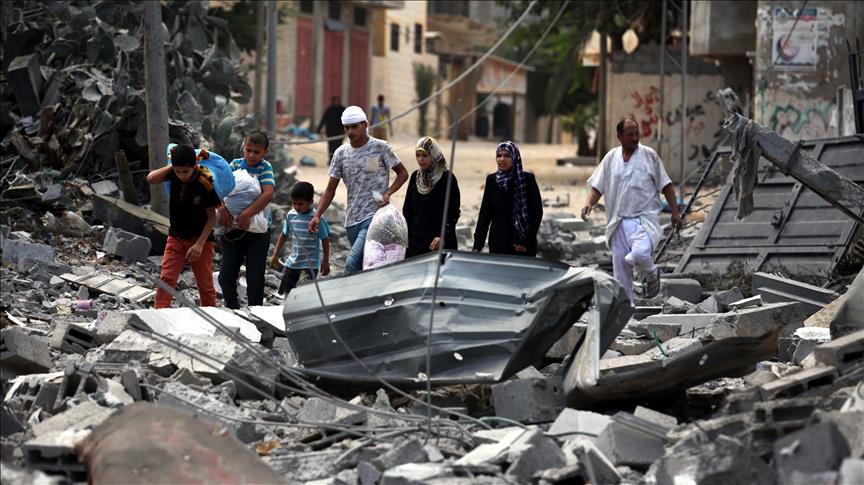
By Ahmed Badawy
RAFAH, Gaza Strip
Mustafa al-Jazzar, 71, cannot forget the massacre committed by Israel in Rafah city, southern Gaza, on Aug. 1, 2014.
The mass killing was part of Israel’s summer offensive against the Gaza Strip last year. The attack killed more than 135 Palestinians within the space of a few hours.
Israel’s 51-day war on the besieged enclave killed more than 2,000 Palestinians and wounded a further 11,000, according to the Palestinian Ministry of Health.
Born in 1944, two years before Israel was founded in historic Palestine, the Rafah massacre is seared into Jazzar's long memory: Israeli fighter jets targeting houses ten at a time, wounded bodies and corpses littering the streets, the pulverizing sound of indiscriminate artillery shelling, women’s screams, children’s attempts to find shelter in the narrow alleys.
According to an Amnesty International report released recently, Israel launched the Rafah attack in response to the capture of one its soldiers in the area.
The report, titled “Black Friday: Carnage in Rafah,” revealed “strong evidence” of war crimes having been committed by the Israeli military on Aug. 1, 2014.
The Israeli government, needless to say, rejected the report and denounced the world-renowned human rights organization.
As Jazzar walked through the streets and alleys of the battered city, he found himself haunted by memories of the massacre he survived.
"The scene was terrifying,” Jazzar told Anadolu Agency. “The bodies, remains and blood of the martyrs were everywhere. The wounded’s screams went unanswered as the ambulances were unable to reach them under the intense shelling. People had to move the wounded on animal-drawn carts or motorcycles.”
"There were more than 70 displaced people running with faces filled with fear,” the survivor continued. “Upon arriving at a dirt road connecting the western part of the city, Israeli aircraft launched strikes on the surrounding houses and then targeted them directly.”
“After hitting them, their bodies were ripped apart to distances of more than 200 meters,” he said. “Most of them were killed. Others injured, but only a few of them made it. The ambulances could not reach them. The injured were transferred to hospital on animal-drawn carts."
Under a sky of heavy bombardment, the old Palestinian man managed to escape and survive.
When the Israeli military finally finished its incursion into the eastern neighborhoods of Rafah City, a trail of dead bodies and destroyed houses was all that was left in their wake.
The following day Jazzar returned to check the scene of the massacre he narrowly survived.
Everything was devastated.
Houses has been reduced to hills of rubble, roads were blocked by wreckage, black smoke rose solemnly to fill the horizon – and the dead bodies were still there.
The shelling had stopped, but the ambulances still could not transfer the dead bodies; the Israeli army had declared the region a “closed military zone,” forcing Palestinians to carry the corpses in their cars.
Dr Khaled Miraaj, director of the emergency department at the Martyr Mohammed Najjar Hospital in Rafah, told Anadolu Agency: "The bodies were lying in the corridors of the hospital. There were not enough rooms to accommodate the wounded, and doctors were busy treating many cases at the same time.”
“The most difficult situation we had,” he continued, “was when the Israeli army asked the director to evacuate the hospital immediately. Then, the western section was directly hit.”
“We were forced to transfer all the wounded and the bodies of the martyrs to a small hospital which was not equipped to work in such circumstances and that could not accommodate those numbers of wounded and martyrs,” he said.
The Israeli army justified the carnage they carried out at Rafah, despite a humanitarian truce being in effect at the time, by accusing Hamas of withholding the body of Lieutenant Hadar Goldin.
The Palestinian resistance group’s armed wing, the Izz al-Deen al-Qassam brigades, had killed him in an ambush in eastern Rafah.
Israel still accuses Hamas of holding Goldin’s body, a claim the resistance group has refused to confirm or deny.
Anadolu Agency website contains only a portion of the news stories offered to subscribers in the AA News Broadcasting System (HAS), and in summarized form. Please contact us for subscription options.







